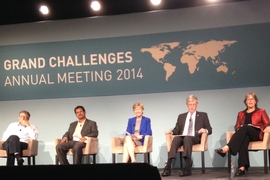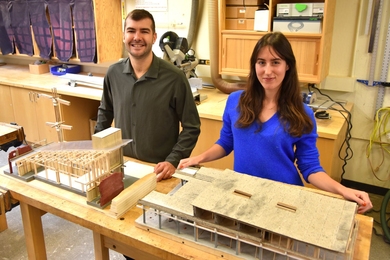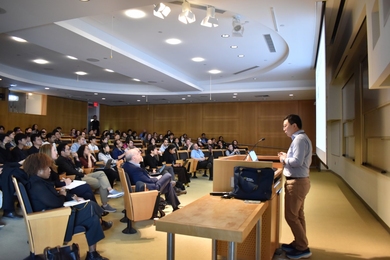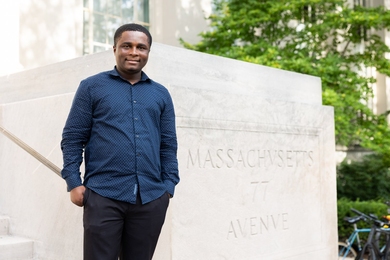On Oct. 1, MIT D-Lab officially began work with Guatemalan social enterprise Soluciones Comunitarias (SolCom) to develop scalable, market-based, local community innovations intended to alleviate some of the causes of endemic poverty in rural areas of Guatemala where there is a strong indigenous presence.
"The cooperation between SolCom and D-Lab creates an opportunity for the people of Nebaj [Guatemala] to develop the kind of useful technologies and knowledge that can save time, reduce workload, and improve the welfare of families," comments Miguel Brito, SolCom’s president.
Over the course of 18 months, D-Lab will offer training in the Creative Capacity Building (CCB) methodology to local SolCom staff, who in turn will offer CCB workshops to community members, providing them with the tools and design strategies to generate low-cost technologies that address local needs. SolCom, through its network of community advisors, will then provide follow-up and support to local innovators to advance their projects, offering seed capital where needed to start production of the products. The most successful projects will ultimately be incorporated into SolCom's portfolio of products distributed through its MicroConsignment network.
In addition to CCB trainings, D-Lab will support SolCom in the creation of a “makerspace” or community innovation center in Nebaj similar to those that D-Lab is supporting in Brazil, Tanzania, and Uganda. The center will serve as an integrated workshop, demonstration site, training center, and retail shop to complement the activities of microentrepreneurs bringing products that are developed to the people that need them.
"We are extremely enthusiastic about partnering with the team at MIT D-Lab because this affords us the truly unique opportunity to leverage the social capital we have built with rural Guatemalan communities to empower practical grassroots innovation,” comments Greg Van Kirk, co-founder of Community Enterprise Solutions, a U.S.-based sister organization to SolCom.
The cooperative agreement between MIT D-Lab and SolCom is funded by the Multilateral Investment Fund (MIF), a member of the Inter-American Development Bank group, as part of their focus in supporting social innovation throughout Latin American. MIF’s partner network will enable the model to expand in other emerging Latin America markets contributing to poverty reduction and rural economic development.
Creative Capacity Building with D-Lab
In 2009, D-Lab began to develop the Creative Capacity Building methodology and has since conducted trainings in Uganda, Tanzania, Zambia, Haiti, Brazil, and El Salvador. CCB trainings build upon the skills, creativity, and local knowledge of participants to develop products that can be made or repaired locally.
In Guatemala, the CCB trainings will help villagers living in poverty define and articulate their own needs and explore the creation — or adaptation — of high-impact, low-cost, technologies that can, through their own ideas and inventions, address household needs or provide an income stream that will help lift their communities out of poverty.
Creative Capacity Building is at the very heart of D-Lab’s organizational values. Amy Smith, D-Lab founder and co-director puts it this way: “D-Lab seeks to change the paradigm of development that sees people living in poverty as needy and vulnerable to one that sees them as capable and creative innovators able to develop the technologies that will improve their lives and livelihoods.”
SolCom’s MicroConsignment Model
With a projected stream of new, locally generated products and services, how will these innovations reach the people that need them most? Through MicroConsignment.
MicroConsignment is a type of microfranchising model developed by Van Kirk that offers a sustainable, replicable means of delivering goods and services to remote villages using entrepreneurship and empowering the villagers to help themselves. Products are provided by SolCom as microfranchisor to community microfranchisees on a consignment basis. MCM delivers essential products and services at affordable prices to the rural poor in the developing world by removing high barriers to entry and empowering microentrepreneurs.
Microentrepreneurs participating in the microconsignment model also serve as essential links to rural communities by providing credible information on the usefulness, affordability, and other benefits of these products; because the sellers are from the communities themselves, consumers are more likely to trust this information from the start.
Win-win
For Kofi Taha, associate director of D-Lab, this collaboration is exciting because “it combines two methodologies at different ends of the innovation pipeline giving both organizations an opportunity to strengthen our work on last-mile access to livelihood and quality of life technologies.” He adds, “D-Lab's village-level design trainings will help SolCom both deepen its knowledge of community needs and discover new product opportunities. Meanwhile, D-Lab will have an opportunity to learn from SolCom's model for local manufacturing and distribution, thereby advancing our understanding of viable pathways for local innovations to reach their impact potential.”
The long term goal of D-Lab's work with SolCom? “The true value will not be the solutions that [the villagers] create today,” said Van Kirk, “but rather the sense of self efficacy that will be created that will ideally continue to grow and effectuate positive change in their communities long after we have left."








